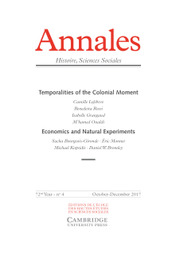No CrossRef data available.
Article contents
Does History Need a Reset?
Published online by Cambridge University Press: 04 April 2017
Abstract
David Armitage and Jo Guldi’s arguments about the crisis of history depend on assertions that have little or no factual basis; they misread their own data. Since the nature of the crisis is in doubt, it follows that the authors’ narrative of its causes must also come into question. Armitage and Guldi confuse microhistory with cultural history and mischaracterize the work of cultural historians. An alternative to their misreading and mischaracterization is to look at previous moments of perceived “crisis”: historians have been worrying about similar issues for nearly a century. To understand the distinctiveness of the present crisis, it would be useful to consider the effects of the relentless democratization of higher education rather than to blame certain historians for pushing history off course.
- Type
- Debating the Longue Durée
- Information
- Annales. Histoire, Sciences Sociales - English Edition , Volume 70 , Issue 2 , June 2015 , pp. 249 - 254
- Copyright
- Copyright © Les Éditions de l’EHESS 2015
References
1. I have done this myself on at least two occasions: Hunt, Lynn, ed., The New Cultural History: Essays (Berkeley: University of California Press, 1989)CrossRefGoogle Scholar; Hunt, , Writing History in the Global Era (New York: W. W. Norton, 2014)Google Scholar.
2. Armitage, David and Guldi, Jo, “The Return of the Longue Durée: An Anglo-American Perspective,” Annales HSS (English Edition) 70, no. 2 (2015): 219–47 Google Scholar, citations at 238, 221, 227–28, 234, and 244.
3. Benjamin M. Schmidt, “What Years do Historians Write About?” Sapping Attention: Digital Humanities; Using Tools from the 1990s to Answer Questions from the 1960s about 19th Century America, May 9, 2013, http://sappingattention.blogspot.com/2013/05/what-years-do-historians-write-about.html.
4. Darnton, Robert, The Great Cat Massacre and Other Episodes in French Cultural History (New York: Basic Books, 1984)Google Scholar.
5. Sewell, William H. Jr., Work and Revolution in France: The Language of Labor from the Old Regime to 1848 (Cambridge: Cambridge University Press, 1980)CrossRefGoogle Scholar; Sewell, , Logics of History: Social Theory and Social Transformation (Chicago: University of Chicago Press, 2005)CrossRefGoogle Scholar.
6. Armitage and Guldi, “The Return of the Longue Durée, 227.
7. Ibid., 229.
8. Davis, Natalie Zemon, Trickster Travels: A Sixteenth-Century Muslim between Worlds (New York: Hill and Wang, 2007)Google Scholar.
9. Darnton, Robert, “Google and the Future of Books,” New York Review of Books, February 12, 2009 Google Scholar, http://www.nybooks.com/articles/2009/02/12/google-the-future-of-books/; Scott, Joan Wallach, The Politics of the Veil (Princeton: Princeton University Press, 2007)Google Scholar; Davis, Nathalie Zemon, Slaves on Screen: Film and Historical Vision (Cambridge: Harvard University Press, 2002)Google Scholar.
10. Armitage and Guldi, “The Return of the Longue Durée, 238.
11. Stevenson, Brenda E., The Contested Murder of Latasha Harlins: Justice, Gender, and the Origins of the LA Riots (Oxford: Oxford University Press, 2013)Google Scholar.
12. Numerous historians collaborated, for instance, in the amici curiae, or “friends of the court” reports in the cases Hollingsworth v. Perry and United States v. Windsor. See, for example: Respect for Marriage Coalition, http://www.respectformarriage.org/news/entry/amici-briefs-filed-in-windsor-and-perry-marriage-cases/.
13. Bassett, John Spencer, “The Present State of Historical Writing,” in “The Writing of History,” 1926 Google Scholar, http://www.historians.org/about-aha-and-membership/aha-history-and-archives/archives/the-writing-of-history/the-present-state-of-historical-writing.
14. Wilbur C. Abbott, “The Influence of Graduate Instruction on Historical Writing,” in “The Writing of History,” 1926, http://www.historians.org/about-aha-and-membership/aha-history-and-archives/archives/the-writing-of-history/the-influence-of-graduate-instruction-on-historical-writing.
15. Bassett, “The Present State of Historical Writing.”
16. Humanities Indicators, “Number of Humanities Faculty Members,” fig. III-9c: “Numbers of Postsecondary Faculty Teaching in Humanities Disciplines, 1999–2012,” http://www.humanitiesindicators.org/content/indicatordoc.aspx?i=71#fig321.
17. Bureau of Labor Statistics, “Occupational Employment and Wages, May 2014, 25-1125, History Teachers, Postsecondary,” http://www.bls.gov/oes/current/oes251125.htm.
18. Monks, James, “Who Are the Part-Time Faculty?” Academe 95, no. 4 (2009)Google Scholar: http:// www.aaup.org/article/who-are-part-time-faculty#.VF6VbofkwpI.
19. For median pay, see “The Just-In-Time Professor,” 2014, http://democrats-edworkforce.house.gov/imo/media/doc/1.24.14-AdjunctEforumReport.pdf; for assistant professor salaries in history, see Robert B. Townsend, “New Report Shows Little Growth in Salaries for History Faculty,” 2010, http://www.historians.org/publications-and-directories/perspectives-on-history/may-2010/new-report-shows-little-growth-in-salaries-for-history-faculty.
Linked content
This is a translation of: Faut-il réinitialiser l'histoire ?


